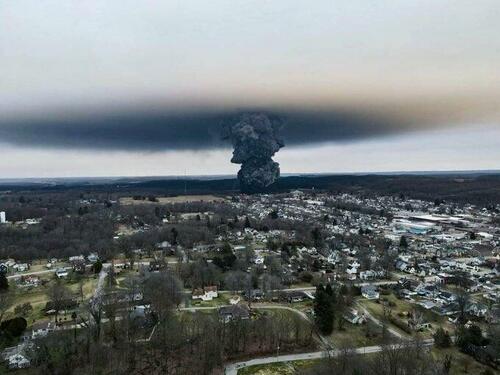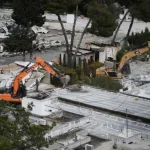
The National Transportation Security Board (NTSB) issued a preliminary report on the derailment of a Norfolk Southern freight train hauling toxic chemicals in East Palestine, Ohio, earlier this month, finding the incident was likely due to an overheated wheel bearing on one of the train cars.
NTSB released the initial findings from its three-week investigation after "five DOT-105 specification tank cars (railcars 28–31 and 55) carrying 115,580 gallons of vinyl chloride" derailed and were subsequently discharged through a controlled burn to prevent a catastrophic explosion. The spill and burn have polluted the air, water, and soil -- residents in the small blue-collar town and surrounding communities have reported feeling sick while some pets and wildfire have mysteriously died.
"Surveillance video from a local residence showed what appeared to be a wheel bearing in the final stage of overheat failure moments before the derailment," the report said. "The wheel bearing and affected wheelset have been collected as evidence and will be examined by the NTSB."
Recall that we directed readers' attention to this surveillance video over a week ago.
OHIO - Security camera footage captured the Norfolk Southern train passing by Salem, OH with flames and sparks under at least one of the cars. #ohiotrainderailment pic.twitter.com/bh1WgiPpSr
— Emmanuelle Saliba (@_esaliba) February 15, 2023
NTSB stated the freight train's wayside defect detector, or hot bearing detector, instructed the crew to stop the train, but it was too late when one of the bearings reached 253 degrees above average, which meets Norfolk Southern's criteria for "critical." At that time, while the train was traveling 47 mph, below the speed limit of 50 mph, the engineer applied the brakes but was unable.
"After the train stopped, the crew observed fire and smoke and notified the Cleveland East dispatcher of a possible derailment," the report said. First responders arrived on the scene around 2100 local time on Feb. 3. NTSB said first responders found:
"As a result of the derailment, 38 rail cars derailed and a fire ensued which damaged an additional 12 cars. There were 20 total hazardous material cars in the train consist—11 of which derailed."
A one-mile evacuation zone, impacting 2,000 East Palestine residents, was immediately implemented after the derailment.
Two days after the derailment, the five derailed DOT-105 specification tank cars (railcars 28–31 and 55) carrying 115,580 gallons of vinyl chloride continued to experience rising temperatures.
"This increase in temperature suggested that the vinyl chloride was undergoing a polymerization reaction, which could pose an explosion hazard," NTSB said.
Due to the increased risk of a massive explosion, Norfolk Southern began a "controlled venting" and burned the toxic chemicals on Feb. 6.
NTSB's investigation is ongoing and will analyze the wheelset and bearing, as well as the venting and burning of the vinyl chloride.
Meanwhile, Norfolk Southern is busy ripping up tracks in East Palestine to remove contaminated soil under the rails that were quickly replaced to resume train service after the derailment.
"I said, 'Come up with another plan to rip up those tracks and dig up that soil.' And they gave me a plan this morning," Norfolk Southern CEO Alan Shaw said in a CNN Town Hall on Wednesday with residents from East Palestine. "We're gonna do what's right for this community."
Here's NTSB's full preliminary report on the East Palestine train derailment.
The National Transportation Security Board (NTSB) issued a preliminary report on the derailment of a Norfolk Southern freight train hauling toxic chemicals in East Palestine, Ohio, earlier this month, finding the incident was likely due to an overheated wheel bearing on one of the train cars.
NTSB released the initial findings from its three-week investigation after “five DOT-105 specification tank cars (railcars 28–31 and 55) carrying 115,580 gallons of vinyl chloride” derailed and were subsequently discharged through a controlled burn to prevent a catastrophic explosion. The spill and burn have polluted the air, water, and soil — residents in the small blue-collar town and surrounding communities have reported feeling sick while some pets and wildfire have mysteriously died.
“Surveillance video from a local residence showed what appeared to be a wheel bearing in the final stage of overheat failure moments before the derailment,” the report said. “The wheel bearing and affected wheelset have been collected as evidence and will be examined by the NTSB.”
Recall that we directed readers’ attention to this surveillance video over a week ago.
OHIO – Security camera footage captured the Norfolk Southern train passing by Salem, OH with flames and sparks under at least one of the cars. #ohiotrainderailment pic.twitter.com/bh1WgiPpSr
— Emmanuelle Saliba (@_esaliba) February 15, 2023
NTSB stated the freight train’s wayside defect detector, or hot bearing detector, instructed the crew to stop the train, but it was too late when one of the bearings reached 253 degrees above average, which meets Norfolk Southern’s criteria for “critical.” At that time, while the train was traveling 47 mph, below the speed limit of 50 mph, the engineer applied the brakes but was unable.
“After the train stopped, the crew observed fire and smoke and notified the Cleveland East dispatcher of a possible derailment,” the report said. First responders arrived on the scene around 2100 local time on Feb. 3. NTSB said first responders found:
“As a result of the derailment, 38 rail cars derailed and a fire ensued which damaged an additional 12 cars. There were 20 total hazardous material cars in the train consist—11 of which derailed.”
A one-mile evacuation zone, impacting 2,000 East Palestine residents, was immediately implemented after the derailment.
Two days after the derailment, the five derailed DOT-105 specification tank cars (railcars 28–31 and 55) carrying 115,580 gallons of vinyl chloride continued to experience rising temperatures.
“This increase in temperature suggested that the vinyl chloride was undergoing a polymerization reaction, which could pose an explosion hazard,” NTSB said.
Due to the increased risk of a massive explosion, Norfolk Southern began a “controlled venting” and burned the toxic chemicals on Feb. 6.
NTSB’s investigation is ongoing and will analyze the wheelset and bearing, as well as the venting and burning of the vinyl chloride.
Meanwhile, Norfolk Southern is busy ripping up tracks in East Palestine to remove contaminated soil under the rails that were quickly replaced to resume train service after the derailment.
“I said, ‘Come up with another plan to rip up those tracks and dig up that soil.’ And they gave me a plan this morning,” Norfolk Southern CEO Alan Shaw said in a CNN Town Hall on Wednesday with residents from East Palestine. “We’re gonna do what’s right for this community.”
Here’s NTSB’s full preliminary report on the East Palestine train derailment.
Loading…






